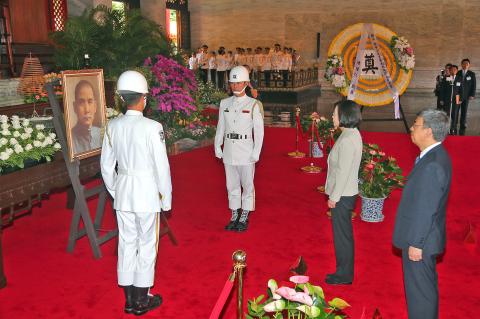President Tsai Ing-wen (蔡英文) yesterday upheld precedent and paid tribute to Republic of China (ROC) founding father Sun Yat-sen (孫逸仙) at the National Revolutionary Martyrs’ Shrine in Taipei, but the traditionally formality-rich ceremony was reduced to just six minutes.
Tsai was greeted by an honor guard representing the three branches of the nation’s armed forces as she arrived at 10am along with Vice President Chen Chien-jen (陳建仁), Presidential Office Secretary-General Lin Bih-jaw (林碧炤), and the heads of the five branches of the government.
The ceremony consisted of three parts, including the playing of national anthem, presentation of a floral wreath, and three bows to the altar. Neither Tsai nor the heads of the five government branches sang the anthem during the event, but Chen did.

Photo: CNA
The Presidential Office also canceled a traditional ritual called yaoji — meaning paying tribute to the tomb of someone from afar — to Sun, who was buried in Nanjing, China, as well as civilian and military “martyrs” who died during several wars and rebellions before and after the founding of the ROC in 1912.
The service was a stark contrast to past ceremonies under former president Ma Ying-jeou (馬英九), which usually lasted up to 30 minutes and involved other procedures such as the offering of fruit, the burning of incense and the recitation of a liturgical text.
Shrugging off speculation that the simplification of the ceremony carried political connotations, Presidential Office Spokesman Alex Huang (黃重諺) said it is the thought that counts.
Huang said it is customary for newly sworn-in presidents to pay tribute to Sun at the shrine, which was constructed in the 1960s by then-president Chiang Kai-shek (蔣介石).
“In the past, such a ceremony revolved around a yaoji ritual to the ROC’s founding father, but since we are now living in a democracy, we decided to perform a simple tribute to Sun and national martyrs instead,” Huang said, describing the ceremony as simple, but solemn.
A group of pro-independence activists staged a protest outside the shrine against Tsai’s decision to observe the ceremony, holding banners reading “Taiwan Republic” and demanding that Tsai refrain from worshiping the martyrs and founding father of a “Chinese government-in-exile.”
“Tsai should put an end to the ideology of sinicization promoted by the Chinese Nationalist Party [KMT] when the party was in power and enjoyed a legislative majority,” said Leung Man-to (梁文韜), a Hong Kong-born professor teaching at National Cheng Kung University’s department of political science.
Leung said that Taiwanese have fought for seven decades to see a political party representing them take total control of the nation, urging Tsai not to follow in the steps of the authoritarian KMT regime and lock the nation into a China-centered historical perspective.
Taiwan Solidarity Union Department of Youth Affairs director Chang Chao-lin (張兆林) said that while they viewed positively Tsai’s abrogation of the yaoji ritual, she must be solemnly reminded that her policies and values should not run counter to Taiwan’s status as an independent sovereign state.
The protesters also called on the new president to convert the shrine into a memorial hall commemorating Taiwanese who sacrificed their lives fighting foreign colonists.

An essay competition jointly organized by a local writing society and a publisher affiliated with the Chinese Communist Party (CCP) might have contravened the Act Governing Relations Between the People of the Taiwan Area and the Mainland Area (臺灣地區與大陸地區人民關係條例), the Mainland Affairs Council (MAC) said on Thursday. “In this case, the partner organization is clearly an agency under the CCP’s Fujian Provincial Committee,” MAC Deputy Minister and spokesperson Liang Wen-chieh (梁文傑) said at a news briefing in Taipei. “It also involves bringing Taiwanese students to China with all-expenses-paid arrangements to attend award ceremonies and camps,” Liang said. Those two “characteristics” are typically sufficient

A magnitude 5.9 earthquake that struck about 33km off the coast of Hualien City was the "main shock" in a series of quakes in the area, with aftershocks expected over the next three days, the Central Weather Administration (CWA) said yesterday. Prior to the magnitude 5.9 quake shaking most of Taiwan at 6:53pm yesterday, six other earthquakes stronger than a magnitude of 4, starting with a magnitude 5.5 quake at 6:09pm, occurred in the area. CWA Seismological Center Director Wu Chien-fu (吳健富) confirmed that the quakes were all part of the same series and that the magnitude 5.5 temblor was

The brilliant blue waters, thick foliage and bucolic atmosphere on this seemingly idyllic archipelago deep in the Pacific Ocean belie the key role it now plays in a titanic geopolitical struggle. Palau is again on the front line as China, and the US and its allies prepare their forces in an intensifying contest for control over the Asia-Pacific region. The democratic nation of just 17,000 people hosts US-controlled airstrips and soon-to-be-completed radar installations that the US military describes as “critical” to monitoring vast swathes of water and airspace. It is also a key piece of the second island chain, a string of

The Central Weather Administration has issued a heat alert for southeastern Taiwan, warning of temperatures as high as 36°C today, while alerting some coastal areas of strong winds later in the day. Kaohsiung’s Neimen District (內門) and Pingtung County’s Neipu Township (內埔) are under an orange heat alert, which warns of temperatures as high as 36°C for three consecutive days, the CWA said, citing southwest winds. The heat would also extend to Tainan’s Nansi (楠西) and Yujing (玉井) districts, as well as Pingtung’s Gaoshu (高樹), Yanpu (鹽埔) and Majia (瑪家) townships, it said, forecasting highs of up to 36°C in those areas